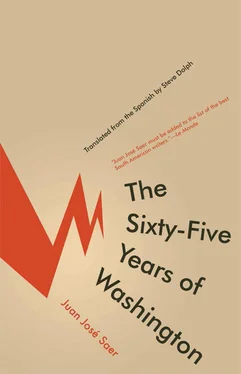Juan José Saer - The Sixty-Five Years of Washington
Здесь есть возможность читать онлайн «Juan José Saer - The Sixty-Five Years of Washington» весь текст электронной книги совершенно бесплатно (целиком полную версию без сокращений). В некоторых случаях можно слушать аудио, скачать через торрент в формате fb2 и присутствует краткое содержание. Год выпуска: 2010, Издательство: Open Letter, Жанр: Современная проза, на английском языке. Описание произведения, (предисловие) а так же отзывы посетителей доступны на портале библиотеки ЛибКат.
- Название:The Sixty-Five Years of Washington
- Автор:
- Издательство:Open Letter
- Жанр:
- Год:2010
- ISBN:нет данных
- Рейтинг книги:3 / 5. Голосов: 1
-
Избранное:Добавить в избранное
- Отзывы:
-
Ваша оценка:
- 60
- 1
- 2
- 3
- 4
- 5
The Sixty-Five Years of Washington: краткое содержание, описание и аннотация
Предлагаем к чтению аннотацию, описание, краткое содержание или предисловие (зависит от того, что написал сам автор книги «The Sixty-Five Years of Washington»). Если вы не нашли необходимую информацию о книге — напишите в комментариях, мы постараемся отыскать её.
The Sixty-Five Years of Washington — читать онлайн бесплатно полную книгу (весь текст) целиком
Ниже представлен текст книги, разбитый по страницам. Система сохранения места последней прочитанной страницы, позволяет с удобством читать онлайн бесплатно книгу «The Sixty-Five Years of Washington», без необходимости каждый раз заново искать на чём Вы остановились. Поставьте закладку, и сможете в любой момент перейти на страницу, на которой закончили чтение.
Интервал:
Закладка:
Okay. Time to say goodbye and finish it , Leto thinks, but as if he had guessed his thoughts, the Mathematician is already extending his hand. Leto holds out his. The look they exchange when they say goodbye, brief and polite, expresses many things that both perceive and register carefully, discreetly, and intuitively. Leto’s look says more or less the following: Frankly, when you whistled at me back there, I didn’t have a single ounce of interest in having someone pester me for fifteen blocks, especially since I only knew you through Tomatis’s patently unenthusiastic references, and your physical appearance and style of dress don’t favor you much with the poor mortals you happen upon. But after our walk I have to admit that your personality, although not without its pedantries, is more or less pleasant, and things haven’t gone badly. Furthermore, at some point I thought the whole thing was going to fall apart, but don’t worry, to me, it’s like the thing with the pants never happened . And the Mathematician’s — more or less as well, no? — and as we’ve said, without a trace of words: I’m aware of your reticence. I’ll try to understand it. And I’m aware of Tomatis’s too. But that doesn’t matter to me. The two of you, because I was born among uninteresting people, perceive uninteresting things in me, which is the cause, I’m sure, of that reticence. Let’s take the pants, for example. I know I shouldn’t let them be so important. But the feeling is stronger than me. At any point, if my white pants are in danger, my whole being feels in danger, because my whole being — who knows why, probably because of the uninteresting things that persist in me despite my efforts to eradicate them — though it seems strange, is concentrated in my pants. But I could offer some objections too, if I wanted. Tomatis, for example, wasn’t so brilliant. And in your case, I’m not sure you’ve understood everything with so much patience, detail, and scrupulous respect for the truth I’ve been trying to tell you. More than once I caught you thinking of something else, and at one point I wondered if you were taking advantage of the thing with the pants. But why bother with all this — they’re details that belong to the category of the uninteresting. Don’t you think there are more important things for the time we’ve been given? De rerum natura or Spinoza’s Ethics, for example, or the debate over the EPR paradox .
And so on. When they let go their hands, the Mathematician, taking advantage of a favorable stoplight, crosses the street at a diagonal, toward the plaza, while Leto, hesitant, undecided whether to continue, watches with an inexpressive, almost inert gaze. The Mathematician’s tanned, athletic, tall, and blonde-haired body, dressed in a white shirt, the blinding white pants that inspired a momentary enslavement in their owner, the white moccasins which Leto does not know were bought the month before in Florence and are worn sock-less with an excess of affected simplicity, the combination so stereotypical of the decade’s aesthetic ideal that a rational advertiser would have rejected him from a billboard for fear that his exaggerated perfection, producing a refusal effect, would lower sales of the products he was meant to sell, the Mathematician — in a word, no? — or in two, to be more precise, leaves the street behind, and stepping into the plaza, and always at a diagonal, moves away from the corner on the red brick path between the green flowerbeds where, juxtaposed against the cloudless blue sky and a landscape of block-long public buildings three or four stories tall, grow bitter orange trees, rubber trees, palo borrachos , and palms. Leto’s gaze follows him, more indolent than attentive and, unconsciously, at the level of thought that under layers of archaic rumination and delirium is always yoked to the essential, insolubly glued, so to speak, to the profound illusion of the external, watches as he is lost to the unreality of the morning, the translucent stuff of space and time that, with every step, swallows and returns him, over and over, with an impalpable rhythm, an absurd yet stable cluster of gradually diminishing radiation, less distinct as he moves away, a dense flux revealed and immediately erased again by the daylight. But when he reaches the center of the plaza, an acquaintance, coming in the opposite direction, intercepts him and they start to talk. From a distance Leto thinks he can imagine the conversation of which he catches only a few gestures and two or three head movements. He imagines hearing again the list of cities and the images associated with each — Paris, an unexpected rainstorm; London, a problem finding hotel rooms and some manuscripts in the British Museum; Warsaw, there was nothing left; Brussels, for The Census at Bethlehem ; La Rochelle, sparkling white; etc., etc. — and, satisfied with the fresh rendering of the white image that had been losing its reality, recovering, through an illusory, conventional conversation, a somewhat more familiar humanity, he starts to cross the intersection.
The same lack of obligation that, some fifty-five minutes before, give or take, had compelled him to get off the bus and, instead of going to work, start walking down San Martín, now induces him to continue, though his decision is supplemented by the fear that, having told the Mathematician about his intention to continue straight, the white figure chatting with an acquaintance in the middle of the plaza might turn around and, seeing him still standing on the corner, killing time or undecided where to go, would suspect that what he had said was just a pretext for unburdening himself from him. But when he reaches the opposite sidewalk this apprehension disappears. Washington’s birthday, the mosquitos, Noca’s horse, the table set under the imaginary pavilion, at once persistent and inconstant, clicking along in a unique, complex order, now make up a carousel of memories more intense, significant, but nevertheless more enigmatic, you could say, than many others which, originating in his own experience, ought to be stronger and more immediately present in his memory. And the passing distractions, the opacity of certain allusions — apparently evident to Tomatis and the Mathematician — instead of diluting those images, clarify them, the way a crevice, by forcing a ray of light to pass through its tiny opening, contributes to a greater display of its richness in the concentrated darkness. Without realizing their fantastical aspect, Leto examines them, holds them — or accepts their persistence, passively — in the white circle of his attention, the way a traveler, projecting the artificial images of his recent trip, trying to gather together everything that escaped his attention just when the picture was taken, lingers a while studying the details of some slides more than others. The complete morning, including his body crossing through it over the gray pavement, and the intangible, ubiquitous “I” he carries inside him, disappear behind the images that, now almost definitive are, though they come from his memory, permanent and more indestructible, you could say, than the breath and flesh that contain them. They are, in any case, interwoven with them in spite of coming from the impalpable, articulate, and reverberant voice which, for several blocks, has been disseminated in the external transparency through the white, even teeth and well-formed, almost mythic superhero lips of the Mathematician. Until his death, certain associations, with greater or lesser force, will recall them, so dependent on each other that at some point he will no longer know which came first, the image or the association, and in some cases, as proof of their insoluble adhesion, so to speak, they will act upon each other without even reaching his consciousness, in the form of short sparks, pulses, and anonymous, shapeless signs that will wrinkle slightly the fissures, to put a word to it, of his being — his being, no? — or rather the incomprehensible formed into a continuous presence, a sensitive lump trapped in a nameless something, a slow whirlwind that it’s simultaneously part of, a spiral of energy and matter that is at once the womb that produces it and the knife — neither friend nor enemy — that slices it open.
Читать дальшеИнтервал:
Закладка:
Похожие книги на «The Sixty-Five Years of Washington»
Представляем Вашему вниманию похожие книги на «The Sixty-Five Years of Washington» списком для выбора. Мы отобрали схожую по названию и смыслу литературу в надежде предоставить читателям больше вариантов отыскать новые, интересные, ещё непрочитанные произведения.
Обсуждение, отзывы о книге «The Sixty-Five Years of Washington» и просто собственные мнения читателей. Оставьте ваши комментарии, напишите, что Вы думаете о произведении, его смысле или главных героях. Укажите что конкретно понравилось, а что нет, и почему Вы так считаете.












